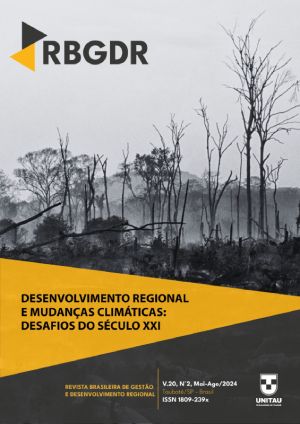Evaluation of the impact of the new legislation for family wineries based on the case of Vale dos Vinhedos, RS
DOI:
https://doi.org/10.54399/rbgdr.v20i2.7261Abstract
The formalization of family wineries (VFs) has historically been hampered by the lack of adaptation of health, environmental, and tax legislation to the reality of family agro-industries. In 2014, Law 12.959/14, the so-called "Colonial Wine Law", created more suitable conditions for the registration of family wineries. In 2018, this context was expanded through the implementation of Federal Complementary Law 1,255 of 2016 and tax adherence to Simples Nacional. Given this context, the objective of this study was to evaluate the formalization of family wineries based on the analysis of wineries registered in the territory of Vale dos Vinhedos, in Serra Gaúcha. The study, of an exploratory nature and qualitative approach, was based on documental research, landscape reading and information collected in semi-structured interviews, carried out with VFs owners in 2023. actors the difference between colonial wineries and family wineries, the obstacles, bottlenecks and solutions adopted in the registration process of these establishments. The study made it possible to get to know and characterize family farming in the territory, the difference between colonial wineries and family wineries, the obstacles, bottlenecks, and solutions adopted in the process of registering these establishments. The legalization of the VFs in the Vale dos Vinhedos has promoted the aggregation of income in viticulture, the return or permanence of young people in the countryside, and increased tourism in the region, consolidating existing public policies for the sector and strengthening associations.
Downloads
Published
How to Cite
Issue
Section
License
Copyright (c) 2024 Revista Brasileira de Gestão e Desenvolvimento Regional

This work is licensed under a Creative Commons Attribution-NonCommercial 4.0 International License.
Authors who have their papers accepted and published in the Brazilian Journal of Regional Management and Development must agree to the copyright policy CC BY https://creativecommons.org/licenses/by/4.0/.
If the article is accepted for publication, the copyright is automatically assigned to the Brazilian Journal of Regional Management and Development.

















